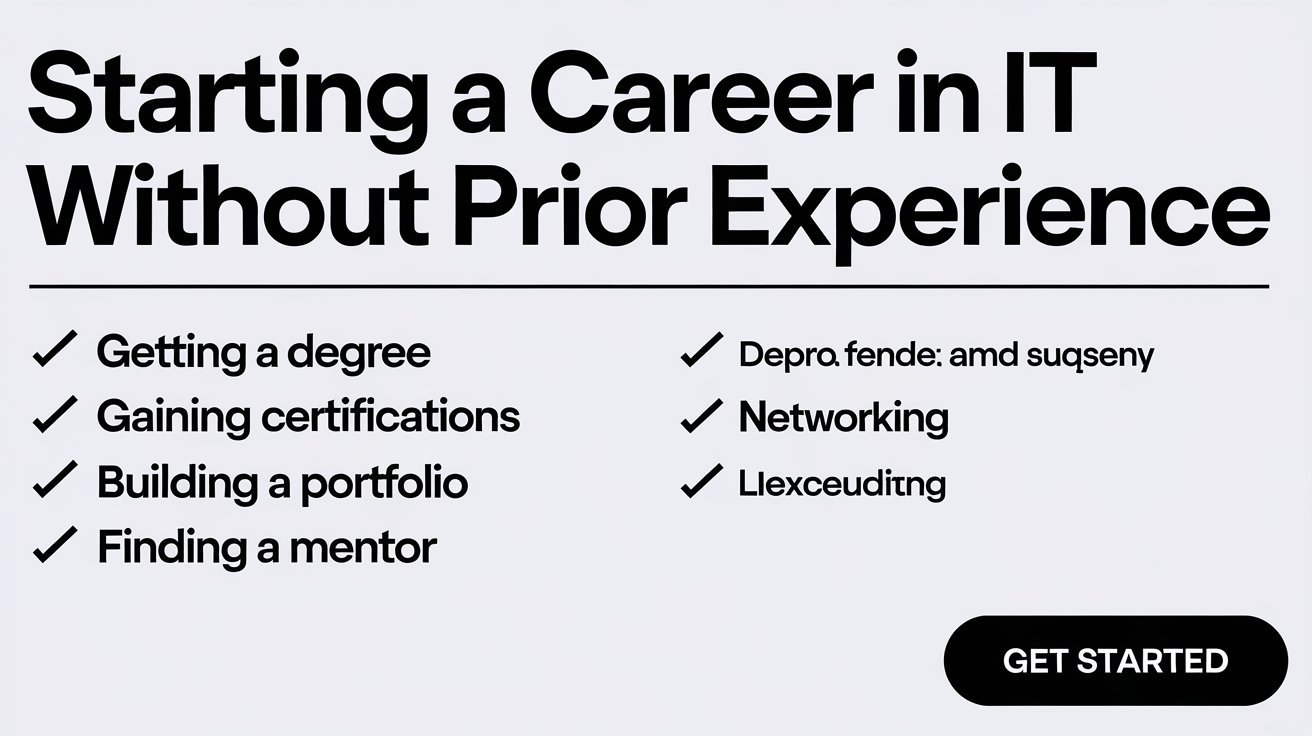Starting a career in Information Technology (IT) without any prior experience may seem daunting, but with the right approach, dedication, and resources, you can build a successful career in this ever-growing industry. Whether you’re transitioning from another field or just beginning your professional journey, this guide from Vibe Logics will walk you through the essential steps to break into IT without prior experience.
Why Choose a Career in IT?
The IT industry is booming, offering high salaries, job security, and endless career growth opportunities. With remote work becoming more common, IT professionals enjoy flexibility while contributing to innovative projects. Additionally, IT offers a wide variety of roles, from cybersecurity to web development, ensuring that there is a path suited for everyone.
Steps to Get Started Career in IT with No Experience
1. Identify Your Area of Interest
“IT” is a broad field, and understanding your interests will help you choose a suitable career path. Some popular IT fields include:
- Software Development (coding, web development, mobile apps)
- Cybersecurity (protecting data and networks from threats)
- IT Support (helping businesses with technical issues)
- Cloud Computing (managing online storage and services)
- Data Science (analyzing and interpreting large datasets)
- Networking (maintaining and securing communication systems)
2. Learn basic IT skills and start a career in IT.
Even without formal education, you can develop IT skills through free or affordable online resources. Start with:
- Basic Computer Knowledge: Learn about hardware, software, operating systems, and networking.
- Programming Languages: Python, JavaScript, and SQL are excellent starting points.
- IT Support Fundamentals: Google’s IT Support Professional Certificate is a great introduction.
- Cybersecurity Basics: Learn about online security threats and protections.
3. Start a certified career in IT.
IT certifications can enhance your credibility and open up entry-level job opportunities. Some top certifications for beginners include:
- CompTIA A+ (IT Support & Helpdesk)
- Google IT Support Professional Certificate
- AWS Certified Cloud Practitioner (Cloud Computing Basics)
- Cisco CCNA (Networking Fundamentals)
- Microsoft Fundamentals Certifications
4. Gain experience in starting a career in IT.
Since experience is crucial, try these approaches to gain practical knowledge:
- Freelance Projects: Offer services on platforms like Fiverr and Upwork.
- Internships and Volunteer Work: Many organizations need IT support and accept beginners.
- Personal Projects: Build a website, create an app, or set up a home lab.
- Participate in Hackathons and Open Source Projects: These help you collaborate with experienced professionals.
5. Create a Strong Resume and LinkedIn Profile
Highlight your skills, certifications, and projects on your resume and LinkedIn profile. Use keywords related to your chosen IT field to make your profile more discoverable by recruiters.
6. Apply for Entry-Level IT Jobs
Begin with job titles such as:
- IT Support Specialist
- Helpdesk Technician
- Junior Web Developer
- Network Technician
- System Administrator (Junior Level)
- QA Tester
FAQ
How do I get started in IT with no experience on Reddit?
Reddit is an excellent platform for career advice and learning. Join subreddits like r/ITCareerQuestions, r/learnprogramming, and r/sysadmin to ask questions, follow discussions, and learn from industry professionals.
What is the easiest IT job to start with?
Some of the easiest entry-level IT jobs include:
- IT Support Technician
- Helpdesk Analyst
- Junior Web Developer
- Data Entry Specialist
- QA Tester
How do you start as an IT beginner?
- Learn the basics through free courses and tutorials.
- Get hands-on experience by working on projects.
- Earn certifications to validate your skills.
- Apply for entry-level jobs and internships.
Which course is best for an IT job with no experience?
Some beginner-friendly courses include:
- Google IT Support Professional Certificate
- Harvard’s CS50 (Introduction to Computer Science)
- FreeCodeCamp (Web Development & Python Programming)
- Coursera’s Python for Everybody
Is 30 too late to get into tech?
Not! Many people transition into IT in their 30s, 40s, or even 50s. The key is continuous learning and gaining hands-on experience. Employers value skills more than age.
Which job is best for career growth?
Fields with high career growth potential include:
- Cybersecurity
- Cloud Computing
- Software Development
- AI & Machine Learning
- Data Science
Which job is easy and high salary?
Some high-paying, relatively easy-to-enter IT jobs include:
- Cybersecurity Analyst (Entry-level salaries: $70K+)
- Cloud Support Associate ($60K+)
- Web Developer ($65K+)
What jobs will AI replace?
AI is expected to replace repetitive and rule-based jobs, such as:
- Data Entry Clerks
- Routine IT Support Roles
- Customer Support (Basic Chatbots)
- Basic Coding & Testing Jobs
However, jobs requiring creativity, problem-solving, and human interaction will remain valuable.
What is a stable job in IT?
Some of the most stable IT jobs include:
- Cybersecurity Specialist
- Cloud Architect
- Network Administrator
- Database Administrator
Conclusion
Breaking into IT with no experience is possible with the right strategy and persistence. Start by identifying your area of interest, learning essential skills, obtaining certifications, and gaining hands-on experience. Use online platforms, communities like Reddit, and networking to find job opportunities. The tech industry is evolving, and there is always room for new talent. Stay dedicated, and soon you’ll find yourself in a rewarding IT career.
For more expert insights, stay tuned to Vibe Logics!



